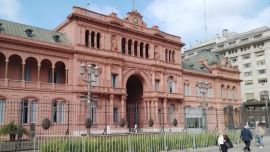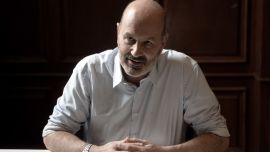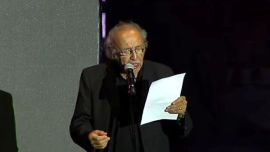Diego Armando Maradona, the legendary number 10 who guided Argentina to World Cup glory, thrilling the world in ways no other footballer had done before, has died.
The Gimnasia y Esgrima La Plata coach, 60, passed away after suffering a cardiac arrest at his house in San Andrés, near Tigre, north of Buenos Aires.
Maradona, one of the greatest footballers ever to have graced the sport, had recently undergone brain surgery.
Multiple news outlets confirmed the news, reporting that the Albiceleste star had fainted at home close to noon. Three ambulances quickly arrived on the scene, but were unable to revive him.
Maradona left hospital two weeks ago, eight days after undergoing surgery to remove a blood clot lodged between his brain and skull at a clinic in Olivos.
The Argentine World Cup-winning captain had looked unwell during a brief appearance on October 30 to mark his 60th birthday at the Gimnasia's stadium. He seemed to have difficulty walking and did not stay to watch his team's game.
The following Monday, he was taken to hospital in La Plata, where the club is based, suffering from symptoms of anaemia and dehydration.
Tests revealed the blood clot, after which Maradona was transferred to a specialist clinic in the capital.
Maradona has been admitted to hospital three times in the last 20 years for serious health issues – two of which were potentially fatal – due to his drug and alcohol addictions. He remained dependent on alcohol, according to reports.
Alongside Brazil's Pelé, who turned 80 last month, Maradona is regarded by many as the greatest footballer of all time.
Swiftly after news of the story broke, the national government declared three days of mourning.
Tributes flooded in from across the world, with a host of a public figures in Argentina expressing their condolences.
Vice-President Cristina Fernández de Kirchner was among those who paid tribute to the fallen legend, expressing "great sadness" at the death of "a giant."
Ex-head of state Mauricio Macri, a former club president of Boca Juniors who famously clashed with Maradona both culturally and politically said it was "a very sad day for all football fans in the world, especially Argentines."
He added: "The enormous joys that Diego gave us will be indelible."
In an interview with TyC Sports, Alberto Fernández said Argentina would never be able to thank Maradona for the joy he has given the nation.
"Diego was Argentina in the world. He filled us with joy and we will never be able to pay him back," said the president, describing Maradona as "an absolute genuine man."
"He was an absolutely genuine man. He was not a fake man, he was a genuine man who expressed everything with the force with which he played football," he said.
Graced by God
Maradona will forever be known for his "Hand of God" goal against England in the 1986 World Cup quarter-final in Mexico, when he appeared to use his hand to push the ball into the net before later swerving through the English defenders for a memorable second goal that sealed victory.
Pelé said Maradona had been a "dear friend" and said he hoped they would "play together in the sky" one day.
Gary Lineker, who was in the England team defeated in 1986, tweeted that Maradona was "arguably the greatest of all time" but made a reference to that infamous goal by adding: "After a blessed but troubled life, hopefully he'll finally find some comfort in the hands of God. #RipDiego"
Lionel Messi, a fellow Argentine considered one of the world's greatest modern-day players, said simply Maradona was "eternal."
The life of the divine footballing talent that was Diego Armando Maradona was marked by wild highs and lows, with Argentina and with club sides Boca Juniors, Barcelona and Napoli. Excesses with cocaine and alcohol had long taken their toll on the mercurial talent's health.
The highs were crowned by his performances when he captained Argentina to victory in Mexico in 1986. In the final, Maradona set up the 86th-minute winner against West Germany. He scored twice in the semi-final against Belgium, beating four defenders for the second.
But the match that defined his tournament, and possibly his international career, was that win over England, in which he scored two goals that will be remembered forever – for very different reasons.
In the 51st minute, as England goalkeeper Peter Shilton reached to catch the ball, Maradona jumped alongside him and with a deftness that fooled the eye, flicked the ball with his hand through the England goalkeeper's arms and into the net.
After the game, Maradona said he scored "a little with the head of Maradona and a little with the hand of God."
The goal he scored four minutes later, when he picked up the ball in his own half and glided past six England players, including Shilton, was named "Goal of the Century" by FIFA.
He played for Argentinos Juniors and Boca in Argentina before joining Barcelona in Spain, but it was in Naples where he would enchant an entire city by leading the then unfashionable club to its only two Italian league titles in 1987 and 1990.
"Always in our hearts. Ciao Diego," Napoli tweeted after his death was announced.
European football's governing body UEFA announced that Maradona would be honoured with a minute's silence before Wednesday's Champions League games.
In 2000, FIFA ran an online Player of the Century poll. Maradona gained 54 percent of the vote, Pele was second with 18 percent, but FIFA declared them joint winners.
Maradona married his long-time girlfriend Claudia Villafane in 1984. They had two daughters, Dalma and Gianinna, and divorced in 2004.
He also had a son, Diego Junior, born in Naples in 1986, although he only acknowledged paternity in 2004.
– TIMES/AFP


























Comments